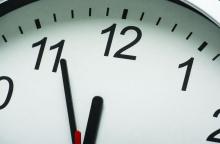On March 13, most of the United States and Canada will advance the clock an hour to be on Daylight Saving Time. Most other countries in the Northern Hemisphere will do the same within a few weeks; and many countries across the Southern Hemisphere turn the clock back an hour around the same time. A friend of mine, who spent time on Capitol Hill, once told me that whether it’s adjusting to Daylight Saving Time (and losing an hour of sleep) or switching back to Standard Time (and picking up an hour), large numbers of Americans call their member of Congress every season to complain.
Why are so many of us annoyed by the semi-annual resetting of clocks? Those reasons also come into play when we change time zones as we travel, when we work on the night shift, or when we live at higher latitudes, where depressive symptoms from seasonal affective disorder (SAD) can plague us as the period of daylight progressively shortens in winter.
Our internal clock(s)
Each of us has a biological master clock keeping track of where we are in our 24-hour day, making ongoing time-of-day-appropriate physical and neurologic adjustments. We refer to those automatic adjustments as “circadian” rhythms – from the Latin, for “around a day” rhythms.
One of the most important regulated functions that is influenced by this time keeping is our sleep-wake cycle. Our brain’s hypothalamus has a kind of “master clock” that receives inputs directly from our eyes, which is how our brain sets our daily cycle period at about 24 hours.
This master clock turns on a tiny structure in our brains, called the pineal gland, to release more of a sleep-inducing chemical, called melatonin, about the same time every evening. The level of melatonin slowly increases to reach maximum deep sleep in the night, then slowly declines as you advance toward morning awakening. The shift from darkness to daylight in the morning, causing your initial morning awakening, releases the excitatory neuromodulator norepinephrine, which, with other chemicals, “turns on the lights” in your brain.
That works well most of the time – but no one told your brain that you were going to arbitrarily go to bed an hour earlier (or in the fall, later) on Circadian Rhythm Time!
We also obviously shift the time on the mechanical clock – requiring a reset of the brain’s master clock – when we travel across time zones or work the night shift. That type of desynchronization of our master clock from the mechanical clock puts our waking and sleeping behaviors out of sync with the production of brain chemicals that affect our alertness and mood. The result may be that you find yourself tired, but not sleepy, and often grumpy or even depressed. As an example, on average, people who work the night shift are just a little bit more anxious and depressed than people who get up to rise and shine with the sun every morning.


